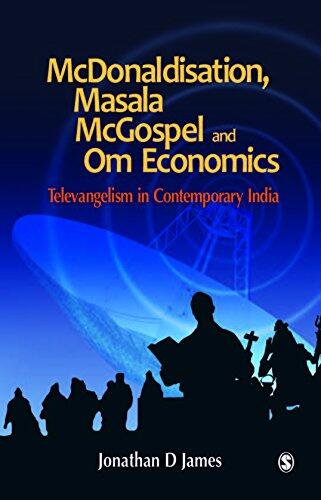
McDonaldisation, Masala McGospel and Om Economics: Televangelism in Contemporary India
بواسطة
Jonathan D James
لا توجد تقييمات بعد
Religion & Spirituality
تنسيق
كيندل
صفحات
261
لغة
الهندية
منشور
Jan 1, 2010
الناشر
SAGE Publications Pvt. Ltd
الطبعة
1
رقم ISBN-10
9385985868
رقم ISBN-13
9789385985867
الوصف
This insightful work delves into the complex interplay between religion, culture, and consumerism in contemporary India, framed through the lens of televangelism. The author explores how television preachers have maneuvered their messages to resonate with a rapidly changing society, merging traditional spiritual practices with modern capitalist influences. There is a compelling examination of how these televangelists adapt the concept of "McDonaldization," reflecting the fast-food industry's principles of efficiency and predictability within religious contexts.
As James navigates the intersections of belief and commerce, the narrative reveals how newer forms of worship are shaped by the demands of a globalized economy. The blending of local faith practices with international business ideologies raises questions about authenticity and commercialization in spirituality. Within this evolving landscape, the author presents an engaging analysis of how masala blends—both in cuisine and ministry—reflect broader cultural shifts.
Throughout the exploration, the reader is invited to consider the implications of this dynamic relationship between religion and economy. Televangelism emerges as a powerful force, redefined by digital access and the nuances of social media, offering insights into both the challenges and opportunities it presents for contemporary worshippers. Singularly unique, this investigation not only sheds light on Indian televangelism but also serves as a case study for understanding similar movements worldwide.
As James navigates the intersections of belief and commerce, the narrative reveals how newer forms of worship are shaped by the demands of a globalized economy. The blending of local faith practices with international business ideologies raises questions about authenticity and commercialization in spirituality. Within this evolving landscape, the author presents an engaging analysis of how masala blends—both in cuisine and ministry—reflect broader cultural shifts.
Throughout the exploration, the reader is invited to consider the implications of this dynamic relationship between religion and economy. Televangelism emerges as a powerful force, redefined by digital access and the nuances of social media, offering insights into both the challenges and opportunities it presents for contemporary worshippers. Singularly unique, this investigation not only sheds light on Indian televangelism but also serves as a case study for understanding similar movements worldwide.